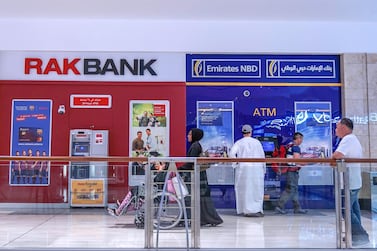The strong earning capacity of banks in the Gulf will help them navigate the current downturn, S&P Global Ratings said on Wednesday.
The buffers developed during healthier times by the region's banks means they could take a hit worth a combined $36 billion (Dh132bn) from the slump caused by Covid-19 and falling oil prices before moving into the red.
"S&P Global Ratings believes that rated banks' profitability and provision cushions built over past years will help them navigate the current rough waters," the ratings agency said.
"Most rated GCC banks have relatively strong profitability and a conservative approach to calculating and setting aside loan-loss provisions."
The 23 banks rated by the agency had assets worth $1.5 trillion at the end of 2019 and are among the most profitable in the world.
Banks' efficiency ratios are also very strong with the average cost-to-income ratio reaching 37 per cent at year-end in 2019 due to the “low cost of labour, the absence of taxes and social contributions (except for nationals of the GCC countries), and stringent approach toward cost control through small branch networks and leveraging technology for customer service,” it said.
"Overall, we estimate that rated GCC banks could absorb up to a $36bn shock before starting to deplete their capital base. This corresponds to about 3x our calculated normalised losses, which implies a substantial level of stress in our view," said S&P Global Ratings credit analyst Mohamed Damak.
The most resilient are the Saudi banks and the least resilient are lenders in Bahrain, according to the report. Kuwaiti banks have a lower resilience than those in Qatar or the UAE because of their high exposure to the real estate sector, it said. It does not expect any issues to arise relating to the $20bn of Tier 1 hybrid capital instruments issued by Gulf lenders over the past five years, some of which fall due for redemption this year.
"As we see the Covid-19 pandemic and the drop in oil price as a profitability event rather than a capital event, we do not foresee that banks will systematically skip the payment of coupons on their hybrid instruments or write down the principal amount," Mr Damak said.
S&P Global Ratings does expect profitability among Gulf banks to weaken due to the dual shock of Covid-19 and the decline in oil prices.
“This is because financing growth will remain limited, with banks focusing more on preserving their asset quality indicators than generating new business," it said.
The coronavirus pandemic, which has infected more than 2.5 million worldwide and killed over 178,000 people, has derailed the global economy and brought trade and the travel industry to a virtual standstill. The global economy is set to contract 3 per cent this year as it slides into the deepest recession since the Great Depression of 1930s, according to the International Monetary Fund.
Oil prices are also currently trading lower due to weak demand and oversupply. US crude, West Texas Intermediate, slipped into negative territory for the first time this week for contracts due to be delivered in May as storage capacity dwindled on the back of weak demand and excess supply. Brent crude recovered to $21.21 by 6.43pm UAE time on Wednesday after falling to a near-21 year low earlier in the day.







